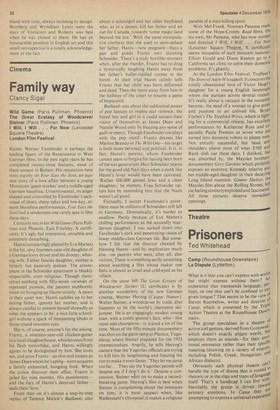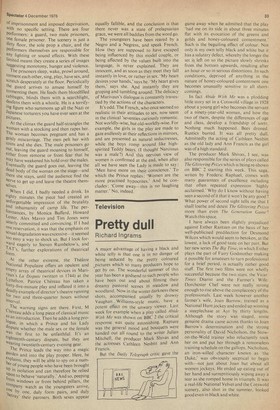Theatre
Prisoners
Ted Whitehead
Camp (Roundhouse Downstairs) La Dispute (Lyttelton)
What is it that you can't express with words but might express without them'? An experience that transcends language, perhaps, or one that can't be confined to given tongue? That seems to be the view Steven Rumbelow, writer and director 0' Camp, which is presented by the Triple Action Theatre at the Roundhouse Downstairs. The group specialises in a theatre n,f action and gesture, derived from Grotowskl' which doesn't exactly abjure words, but employs them as sounds—for their el11°tional resonance rather than their specnIc meaning (drawing on a variety of sourcesd, including Polish, Greek, Hungarian, all African dialects). Obviously such physical theatre ea11,1 handle the type of drama that is rooted In rhetoric or in the slips and traps of language itself. That's a handicap I can live Writ,' Inevitably the group is driven towaru primary emotions. In Camp they are attempting to express a universal experience
of imprisonment and imposed deprivation, with no specific setting. There are four Performers: a guard, two male prisoners, One female prisoner. The scenery is just a dirty floor, the sole prop a chair, and the Performers themselves are responsible for any lighting or sound effects. With these limited means they create a series of images suggesting monotony, hunger and violence. The prisoners sleep, wake, prowl around, torment each other, sing, play, have sex, and scratch desperately at the floor. Periodically the guard arrives to amuse himself by tormenting them. He feeds them bloodfilled cabbages, blinds them with a searchlight, deafens them with a whistle. He is a terrifying figure who summons up all the Nazi or Japanese torturers you have ever seen at the Pictures.
At the climax the guard half-strangles the woman with a stocking and then rapes her. The woman becomes pregnant and has a grisly miscarriage. The men pelt her with coins and she dies. The male prisoners go Out, leaving the guard moaning to himself, either from remorse or from fear that he may have weakened his hold over the males. Eventually the guard goes out, leaving the dead body of the woman on the stage—and there she stays, until the audience find the nerve to get up and leave the theatre themselves.
When I did, I badly needed a drink. In eighty minutes the piece had created an unforgettable impression of the brutality and inhumanity of camp life. The performances, by Monica Bufferd, Howard Lester. Alex Mavro and Tim Jones were Utterly committed and convincing. If I had one reservation, it was that the emphasis on sexual degradation was excessive—it seemed 100 easy a way to shock us. But I look forward eagerly to Steven Rumbelow's, and .r
Ars, further explorations of theatrical form
At the other extreme, the Theatre National Populaire offers an opulent and empty array of theatrical devices in Marivaux's La Dispute (written in 1744) at the LYttelton. Patrice Chereau has taken a jfortY-five-minute play and inflated it into a ueeadly example of director's theatre running or two and three-quarter hours without interval.
The warning signs are there. First, M Chereau adds a long piece of classical music as an introduction. Then he adds a long prologue, in which a Prince and his Lady disPute whether the male sex or the female was the first to be unfaithful. It's an eighteenth-century dispute, but they are wearing twentieth-century evening gear. The Prince leads the way into a magic garden and into the play proper. Here, he ebexPlains, they will be able to spy on a num r °f Young people who have been brought uP in isolation and can therefore be relied fliPon to behave 'naturally.' And so, peeping On windows or from behind pillars. the :111Pany watch as the youngsters arrive, .bne by one, duly form pairs, and duly etraY their partners. Both sexes appear
equally fallible, and the conclusion is that there never was a state of prelapsarian grace, we were all baddies from the word.go.
The youngsters have been reared by a Negro and a Negress, and speak French. How they are supposed to have escaped being influenced by this model couple, or being affected by the values built into the language, is never explained. They are innocent, and as soon as they meet they fall instantly in love, or rather in sex. 'My heart desires your hands,' says he. 'My heart gives them,' says she. Ajld instantly they are groping and tumbling around. The delicacy of Marivaux's dialogue is constantly travestied by the actions of the characters.
It's odd. The French, who once seemed so realistic in their attitudes to sex, now seem in the clinical 'seventies curiously romantic. Not worldly-wise, but old-worldly-wise. For example, the girls in the play are made to gaze endlessly at their reflections in mirrors, and are presented as natural seductresses, while the boys romp around like highspirited Teddy bears. (I thought Narcissus was a male?) And this nervous view of women is confirmed at the end, when after all we have seen the Lady is made to say: 'Men have more on their conscience.' To which the Prince replies: 'Women are the more practised hypocrites.' And he concludes: 'Come away—this is no laughing matter.' No, indeed.







































 Previous page
Previous page